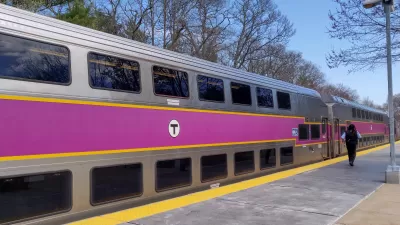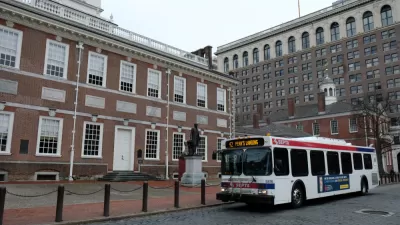The state's plan to dismantle and reorganize its busiest bus plaza faces allegations of civil rights violations.

A group of transit and environmental justice activists has filed a Title VI Civil Rights Act complaint against Rhode Island's Department of Transportation, reports Christian MilNeil. The plaintiffs argue that the Department's plans to dismantle downtown Providence's Kennedy Plaza, Rhode Island's biggest transit hub, would take valuable resources away from communities of color and amount to a violation of civil rights.
The suing organizations, Grow Smart Rhode Island and the South Providence Neighborhood Association, claim that the "deeply flawed and harmful plan by the Rhode Island Department of Transportation (RIDOT)" would "virtually eliminate the central bus hub in downtown Providence," harming Providence transit riders who are majority (53%) people of color. Although publicly available plans are vague, some documents mention a smaller, relocated bus transfer hub, new mini-hubs a quarter-mile away from the current location, and a major reorganization of RIPTA's bus routes.
President of the South Providence Neighborhood Association Dwayne Keys claims that the renovation would "make Kennedy Plaza a kind of tourist attraction" rather than improve transit for the people who already use it on a daily basis. According to the complaint, dismantling the plaza would cause disruptions, create longer commute times, and eliminate access to shelters and restrooms for bus riders, amounting to an effort to remove transit riders from Kennedy Plaza.
FULL STORY: RI’s Kennedy Plaza Plan Faces Civil Rights Challenge

Planetizen Federal Action Tracker
A weekly monitor of how Trump’s orders and actions are impacting planners and planning in America.

Map: Where Senate Republicans Want to Sell Your Public Lands
For public land advocates, the Senate Republicans’ proposal to sell millions of acres of public land in the West is “the biggest fight of their careers.”

Restaurant Patios Were a Pandemic Win — Why Were They so Hard to Keep?
Social distancing requirements and changes in travel patterns prompted cities to pilot new uses for street and sidewalk space. Then it got complicated.

Platform Pilsner: Vancouver Transit Agency Releases... a Beer?
TransLink will receive a portion of every sale of the four-pack.

Toronto Weighs Cheaper Transit, Parking Hikes for Major Events
Special event rates would take effect during large festivals, sports games and concerts to ‘discourage driving, manage congestion and free up space for transit.”

Berlin to Consider Car-Free Zone Larger Than Manhattan
The area bound by the 22-mile Ringbahn would still allow 12 uses of a private automobile per year per person, and several other exemptions.
Urban Design for Planners 1: Software Tools
This six-course series explores essential urban design concepts using open source software and equips planners with the tools they need to participate fully in the urban design process.
Planning for Universal Design
Learn the tools for implementing Universal Design in planning regulations.
Heyer Gruel & Associates PA
JM Goldson LLC
Custer County Colorado
City of Camden Redevelopment Agency
City of Astoria
Transportation Research & Education Center (TREC) at Portland State University
Camden Redevelopment Agency
City of Claremont
Municipality of Princeton (NJ)





























